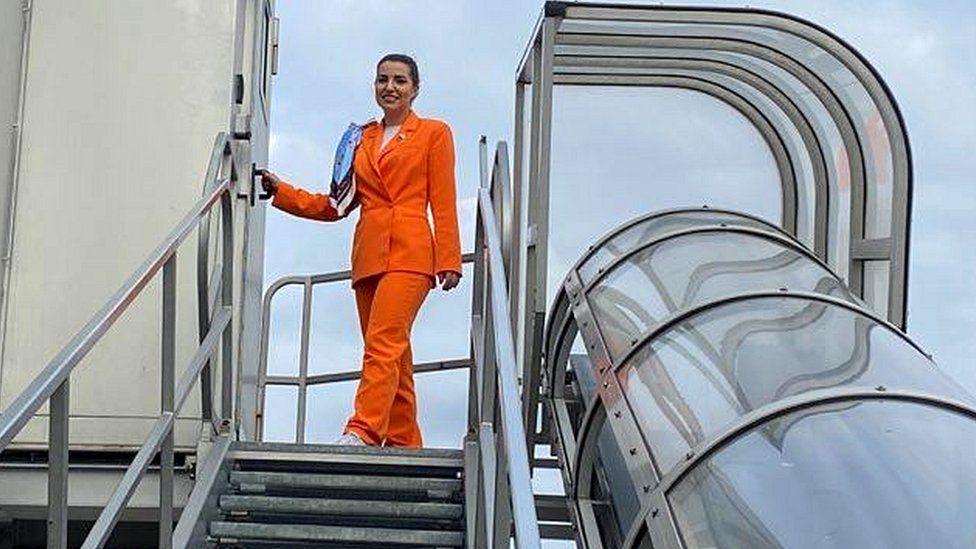By Zhanna Bezpiatchuk BBC Ukrainian, Kyiv
“Twelve hours on your feet, flying to Kyiv to Zanzibar and back. If you wear high heels, you are hardly able to walk afterwards,” says flight attendant Daria Solomennaya, 27.
“That includes four hours of security checks and cleaning.”
She works for SkyUp Airlines, one of the youngest low-cost airlines in Europe, but one of the biggest in Ukraine.
It has now decided to replace the old uniform from next month with a far more comfortable alternative. It isn’t the first in Europe to do so, but for Ukrainians it is a sign that some of the old traditions are being swept away.
An icy wind buffets the tarmac of Kyiv’s Boryspil International Airport and this stewardess for one is happy there is about to a revolution in her company’s dress code.
When SkyUp surveyed its crews, it turned out that its female employees were fed up with their high heels, tight blouses and pencil skirts.
“Many of my colleagues are permanent clients of podologists; their toes and toe-nails are constantly damaged by high heels,” she complains. Varicose and spider veins are other frequent ailments.
Several other airlines have already ditched elements of their dress codes that were previously considered standard in the industry, among them:
Ukraine’s low-cost flier has gone further: out go the high heels, skirts and tight blouses, in come trainers, loose orange jackets and trousers.
“A flight attendant’s work is not that romantic. It’s hard,” explains SkyUp head of marketing Marianna Grygorash. “We realised that our female flight attendants didn’t want to be seen as “sexualised and playful’.”
For decades airlines took advantage of women’s looks to aid their business, often at the cost of their basic comfort and health.
“The typical image of a stewardess is probably more sexualised and associated with the femininity than any other,” says gender expert Olena Strelnyk.
And that was particularly the case in Ukraine, where the stereotype has long been of women more focused on their physical appearance than Western women.
But Ukraine has changed dramatically in recent years and Olena Strelnyk believes it has begun shedding many of its sexist traditions.
That does not mean SkyUp’s Ukrainian competitors are necessarily following suit in shaking up their uniform policies.
Ukraine International Airlines has a big share of the market, and after 30 years of flying it sees no reason to change.
“Our flight attendants have enough time for breaks and their heels aren’t that high at all: they’re rather token,” says the airline. UIA is determined to cling on to traditions in the airline industry and believes each company should decide its own future.
For Daria Solomennaya, the problems with heels and pencil skirts are obvious.
What if an aircraft made an emergency landing on water and a colleague had to rush to open an exit door over the wing, she points out. She would have to clamber over seats while passengers lined up in the aisle.
“Imagine how I could do that in a pencil skirt.”
High heels are equally of little use in an emergency, so she would have to go barefoot under strict security rules.
DRESS CODES: What they mean for cabin crew
But it isn’t just during emergencies where the airline’s old uniform feels inappropriate for what is a physically demanding job, involving irregular hours flying between different time and climate zones.
There is that moment at the start of a journey when all eyes are on the flight attendant, demonstrating what to do in an emergency.
“You put a life vest, a mask and a belt on the ground, as all the seats are occupied by passengers,” Daria explains.
“You bow down carefully in your tight skirt to pick up one item after another. Suddenly it’s as if you’re on a stage and your blouse has leapt up above your skirt.”
Japan Airlines to use gender-neutral greetings
How are the green and amber lists changing on Monday?
Airline workers set up online support networks











